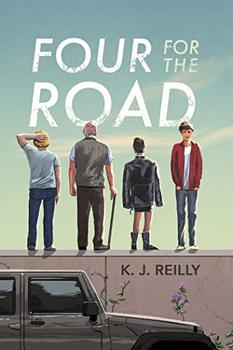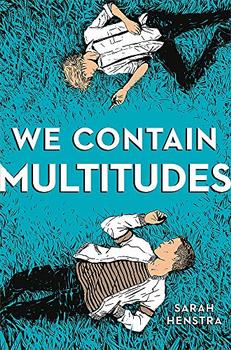Summary | Excerpt | Reading Guide | Reviews | Beyond the book | Read-Alikes | Genres & Themes | Author Bio

We all have youthful experiences we'd like to remove from our memory. Adam Silvera's More Happy Than Not presents a world where we (maybe) really can forget.
Aaron Soto, Silvera's protagonist, is a poor Hispanic teenager. He lives with his mother and brother in a one-bedroom apartment in the Bronx projects. Aaron's father committed suicide, but his presence lingers heavily on the Soto family.
Obviously life isn't great for Aaron, but he has his outlet in Genevieve, his girlfriend, whom he loves more than anything. Aaron and Genevieve have a quirky, yet seemingly genuine relationship. They worry about normal teen experiences: first-time sex and future events in which they'll have to be apart. However, their interactions are filled with proclamations of Aaron being a "dumb-idiot," which is - believe it or not - romantically endearing. Aaron takes Genevieve to view the stars, and she joins him on journeys to the local comic shop. Together, they navigate the world.
With Genevieve, Aaron's life seems relatively uncomplicated - a boy and a girl in love - but complexity soon arrives in the form of Thomas. This new guy, Thomas, makes friends with Aaron and soon it becomes clear that they share a mutual appreciation of classic videogames, comic book characters, and old films. Their friendship develops into a quintessential bromance. Then, it goes even further – and Aaron worries that he might be becoming a "dude-liker."
Initially, Aaron's quick to dispel any attraction he might be feeling toward Thomas. He says, "If I were faced with Sun Warden's decision - whether or not to save his girlfriend or best friend from a dragon - I'm sorry to change my mind, but Thomas would fall away without me moving a muscle. And I would make that choice without a doubt because the bottom line is that Genevieve is my girlfriend and I'm her boyfriend, and Thomas and I are just friends and that's that." He cannot accept his feelings. He fights himself. He fights others. He's in ultimate conflict with everything around him.
If Silvera's novel were to stop here, we'd have another memorable YA novel about the teenage struggle with self and with others. Instead, Silvera continues, and his decision to delve deeper into his characters and let loose in his story makes More Happy Than Not quite revolutionary. Silvera takes science and desires and merges them into something that is strikingly poignant.
Just when Aaron's ready to admit that he's gay, he receives the ultimate disappointment. It's during this part of the novel that Silvera tosses in a twist that is totally unexpected, yet beautifully executed. Suddenly Aaron wants to undergo a revolutionary memory relief procedure with Leteo Insititute, a new medical company that helps suffering souls forget bad experiences. Forgetting past mistakes, hardships, and embarrassments has to be the answer for any teenager to gain back his or her life's control, right? Yeah, not really. Aaron says of the procedure, "It was originally just an insane thought, the kind of thoughts one has at 6:00 A.M. after a sleepless night when life is sucking, but I spent my weekend researching all things Leteo and there's actually hope for me." And then he speaks of the Institute's hopefulness: "Leteo is this place of second chances." If second chances actually existed, this would be a far different world.
Silvera writes in a YA voice that is so true - so near perfect. Aaron wants to fit in; he wants to be like everyone else. His words are so believable as a young man who is vulnerable yet determined. Genevieve and Thomas are rendered quite nicely, too, as young characters emerging into their own identities.
Issues of class and sexuality are on full display here too. Silvera's characters are modern, relatable teens, for sure; however, instead of using phones and the Internet that wealthy, or even middle-income young adults usually rely on for entertainment, Silvera shows his characters playing in the streets and bargain-shopping for cheap comics. Yes, these poor kids struggle with their living situations, but they have a closeness that is enviable by even the richest of kids. While he explores class through multiple characters, Silvera explores sexuality through Aaron alone. He is gay, but he's not sure that he's gay. He loves Genevieve, and he loves Thomas. The confusion is in determining which one he romantically loves, and when he figures out whom he really desires, it's not the outcome he wants. With his decision, Aaron's life will not be as easy, but it will be true.
Readers will likely be surprised to learn that More Happy Than Not is Silvera's debut. This is an exceedingly complex and mature first novel that succeeds on most all levels. For teens under the age of 16, some of the content might be a little too adult. The language is edgy, as are some of the sexual situations, but regardless, it is a stunning examination of why we make the choices we make.
![]() This review was originally published in The BookBrowse Review in June 2015, and has been updated for the
May 2016 edition.
Click here to go to this issue.
This review was originally published in The BookBrowse Review in June 2015, and has been updated for the
May 2016 edition.
Click here to go to this issue.

If you liked More Happy Than Not, try these:

by K J. Reilly
Published 2023
The Perks of Being a Wallflower meets The End of the F***ing World in this dark young adult comedy about four unlikely friends dealing with the messy side of grief who embark on a road trip to Graceland.

by Sarah Henstra
Published 2020
Aristotle and Dante Discover the Secrets of the Universe meets I'll Give You the Sun in an exhilarating and emotional novel about the growing relationship between two teens boys, told through the letters they write to one another.
If you want to build a ship, don't drum up people... but rather teach them to long for the endless immensity of the...
Click Here to find out who said this, as well as discovering other famous literary quotes!
Your guide toexceptional books
BookBrowse seeks out and recommends the best in contemporary fiction and nonfiction—books that not only engage and entertain but also deepen our understanding of ourselves and the world around us.